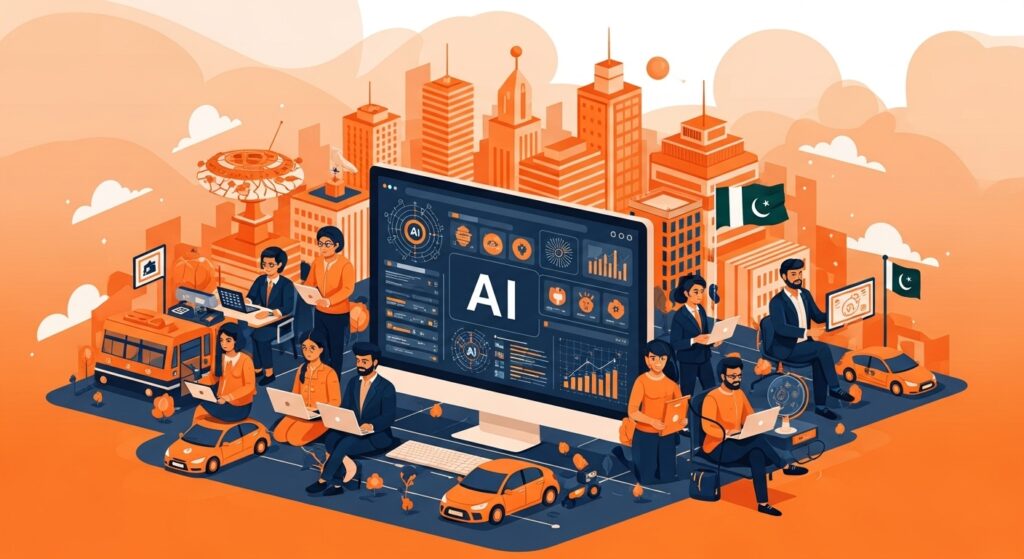
Artificial Intelligence (AI) is rapidly transforming industries around the world, and Pakistan is no exception. The country has begun to recognize the immense potential of AI in revolutionizing everything from healthcare and education to agriculture and security. With growing interest from the government, academia, and private sector, the AI industry in Pakistan is steadily gaining traction. From emerging AI startups to well-established artificial intelligence companies in Pakistan, this technological wave is creating new opportunities and reshaping the future of work.
This blog explores the scope of artificial intelligence in Pakistan, key players in the market, challenges faced, and what the future holds for this transformative technology.

Scope of Artificial Intelligence in Pakistan
AI is no longer a futuristic concept—it is a current necessity. In Pakistan, AI is being integrated into various sectors:
- Healthcare: Predictive diagnostics, robotic surgery, and virtual health assistants are increasingly being adopted.
- Education: AI-driven learning platforms and virtual tutors enhance personalized learning.
- Agriculture: Smart farming techniques, crop monitoring, and yield prediction using machine learning.
- Banking and Finance: Fraud detection, algorithmic trading, and customer support chatbots.
- Government Services: Smart governance systems, traffic management, and surveillance technologies.
The demand for AI professionals is growing, and academic institutions are launching specialized programs and certifications. Initiatives like Pakistan’s National Center of Artificial Intelligence (NCAI) are further boosting research and development in the field.
Artificial Intelligence Companies in Pakistan
Several tech firms have emerged as leaders in AI innovation across Pakistan. These artificial intelligence companies in Pakistan are making significant contributions both locally and internationally:
- VisionX: Specializes in computer vision, machine learning, and AI-powered solutions for global clients.
- Systems Limited: A pioneer in digital transformation and AI-powered enterprise services.
- Airlift Technologies: Utilizes AI for logistics optimization and route planning.
- Bazaar Technologies: Integrates AI to manage supply chain and vendor relationships efficiently.
- Datalatics: Focuses on AI consulting, big data, and predictive analytics.
- Conure Technologies: Offers AI, IoT, and smart city solutions.
These companies are contributing to Pakistan’s global competitiveness in technology and innovation.
Prominent AI Startups in Pakistan
The rise of AI startups in Pakistan is another indicator of the country’s increasing stake in the global tech ecosystem. Some noteworthy names include:
- Sehat Kahani: Uses AI and telemedicine to provide healthcare access in underserved areas.
- Integry: Automates app integrations using machine learning.
- PakAI: A homegrown startup focused on building accessible AI tools and education platforms.
- Neurostic: Provides AI-enabled prosthetics and rehabilitation technology.
- Airlift: Besides being a tech unicorn, it incorporates AI into its operational workflows.
These startups are solving real-world problems with AI, attracting both local and international investors.
Challenges Facing the AI Industry in Pakistan
While the potential is enormous, the AI industry in Pakistan faces several challenges:
- Lack of Skilled Workforce: There’s a shortage of experienced AI professionals and educators.
- Limited Funding: Startups struggle with funding and venture capital support.
- Infrastructure Issues: Poor internet access and limited cloud computing infrastructure in rural areas.
- Regulatory Framework: Absence of policies that promote AI research and data protection.
- Brain Drain: Talented AI engineers often seek opportunities abroad due to limited local incentives.
Despite these barriers, Pakistan is taking steps to build a sustainable AI ecosystem.
Government Initiatives and Academic Support
The Pakistani government has acknowledged AI as a priority area in its digital transformation plans. Notable steps include:
- Establishing the National Center of Artificial Intelligence (NCAI) across major universities.
- Launching AI-focused incubation centers under the National Incubation Center (NIC) network.
- Providing AI and Data Science degree programs at institutions like NUST, LUMS, and FAST.
- Collaborating with international bodies like UNESCO and the World Bank for AI development.
Future Outlook of AI in Pakistan
The future of AI in Pakistan looks promising. With strategic investments, policy reforms, and educational advancements, the country can position itself as a regional leader in AI innovation. The increasing number of tech exports, growing startup culture, and youth engagement in technology signal a positive trajectory for the AI sector.
Potential future developments include:
- Expansion of AI into public policy and national security.
- Development of ethical AI frameworks.
- Greater use of AI in e-commerce, logistics, and fintech.
- Partnerships with international AI labs and research bodies.
Frequently Asked Questions
1. What is the current scope of artificial intelligence in Pakistan?
The scope of artificial intelligence in Pakistan is expanding across sectors like healthcare, education, agriculture, finance, and governance. With government and private sector involvement, AI is becoming an essential driver of innovation and digital transformation in the country.
2. Which are the leading artificial intelligence companies in Pakistan?
Top artificial intelligence companies in Pakistan include VisionX, Systems Limited, Airlift Technologies, Bazaar Technologies, and Datalatics. These firms are innovating in areas like computer vision, logistics, and data analytics.
3. Are there any AI startups in Pakistan worth following?
Yes, several promising AI startups in Pakistan include Sehat Kahani, Integry, Neurostic, and PakAI. These startups are using AI to tackle challenges in healthcare, automation, and accessibility.
4. How is the government supporting the AI industry in Pakistan?
The government has launched initiatives like the National Center of Artificial Intelligence (NCAI) and AI-focused degree programs in leading universities. It’s also promoting startup incubation through National Incubation Centers (NICs).
5. What challenges does the AI industry in Pakistan face?
Major challenges include a shortage of skilled professionals, limited funding, infrastructure issues, and the need for a proper regulatory framework to guide AI development and ethical use.
6. How can students in Pakistan pursue a career in artificial intelligence?
Students can enroll in AI and Data Science programs offered by universities like NUST, LUMS, and FAST. Online certifications and internships at AI startups and tech companies also offer valuable hands-on experience.
7. What is the future of the AI industry in Pakistan?
The AI industry in Pakistan is poised for growth, with increased foreign investment, rising startup activity, and expanding applications in fintech, e-commerce, national security, and more. Strategic policy support and skilled workforce development will be key to its success.
Conclusion
Artificial Intelligence in Pakistan is transitioning from a niche technology to a transformative force across all sectors. From innovative startups to global-level companies, the AI ecosystem is gaining strength. However, to fully harness its potential, focused investments in education, infrastructure, and policy are essential. With the right environment, Pakistan can become a hub for AI innovation in South Asia, opening new avenues for economic growth and technological advancement.
Stay updated with Pakistan’s evolving tech landscape and explore how AI can reshape your industry or career path in the years to come.
